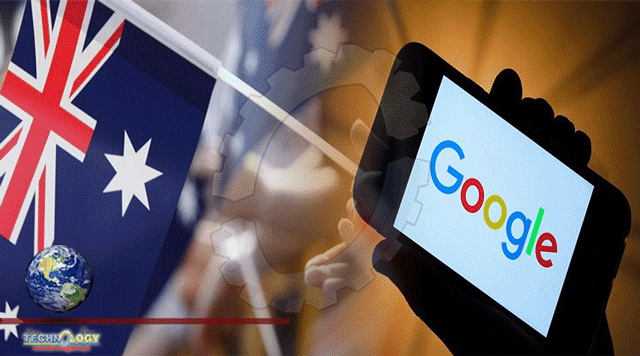Australia Become Ground Zero: Case For How Far Lawmakers Will Go, How Internet Corporations Will Fight Back, Whether Washington Will Defend.

Big Tech is in big trouble. The public is demanding political action to regulate the dominant digital platforms—Google and Facebook in particular. Privacy activists scent blood in the water. Although few ordinary internet users seem to worry about giving away their data, reports about potential identify theft have put many people on edge. Politicians are holding hearings, and the press is only too happy to pile in, hoping to claw back at least a little of the advertising revenue media companies have lost to the internet giants.
But the scene isn’t Washington. It’s Canberra, the Australian capital. And far from just grandstanding for the cameras, the country’s leading politicians are actively pushing legislation that could see Google and Facebook forced to pay Australia’s news outlets for the snippets they show in search results and on users’ timelines. More new laws and regulations are on the way, including mandatory local content rules for streaming platforms such as Netflix, Disney+, and Amazon Prime Video. Amid the growing backlash against the all-powerful digital giants, Australia Has Become Ground Zero: A Test Case For How Far Lawmakers Will Go, How The Internet Corporations Will Fight Back, And Whether Washington Will Defend Them as it has in the past.
How the administration of U.S. President Joe Biden will react to an important foreign ally socking it to some of its most important domestic supporters is an open question. Silicon Valley executives were some of the biggest donors to the Biden campaign, and the companies themselves arguably tilted the social media playing field against former President Donald Trump. The Biden transition team was stacked with midlevel internet executives, and if history is any guide, they are likely to look out for their industry’s interests both at home—where there is growing pressure to regulate, especially in the U.S. Congress—and abroad. Even the Trump administration publicly supported Google and Facebook; it’s hard to imagine the Biden administration refusing to come to their aid.
Not that Big Tech necessarily needs Biden’s help down under. Google has already threatened to simply turn off Google News in Australia, and even its entire search engine, if the country goes ahead with its planned regulations. Australian lawmakers have called this “bullying” and “blackmail,” while Prime Minister Scott Morrison said, “We don’t respond to threats.” But the real issue isn’t that a big foreign company thinks it can steamroll democratic processes in a faraway land (though that may be true too). The real issue is that most politicians and much of the press simply don’t understand how the internet works.
In a true free market for news snippets, media outlets would be paying Google and Facebook to feature their content, just as advertisers buy top placement in search results. Even Big Tech has been too shy to fully press its advantage here, preferring the safe strategy of up-ranking establishment news outlets with political connections and lobbying dollars for free while suppressing smaller, questionable, and heterodox news sites. Google and Facebook make a fortune on search, but news is essentially a loss leader. Its economic value lies in keeping users engaged on their platforms, not in selling ads.
That engagement is worth something to Google but not as much as the politicians and their media allies seem to believe. Facing similar government pressure to pay for news in France, Google reached an agreement with mainstream publishers to pay them to feature extended snippets with bullet points in a new product called News Showcase, which gives each news outlet a small patch of proprietary territory on the Google News page. The new format will presumably give publishers the opportunity to place advertising content on these custom panels—and give Google the opportunity to take a cut for itself.
But Australia is demanding something much more intrusive than a simple cut of Google’s ad revenue: It wants Google to submit its news search algorithms to a government agency for review and approval. That seemingly small change would shake the internet to its core. Putting a government regulator in charge of Google Search would effectively nationalize the service—and make it virtually useless. It would represent a return to the 1990s for internet search.
What Australian lawmakers and their supporters don’t understand is that a modern search algorithm isn’t a fixed program that translates a user query into a uniform result. It is a personalized service that uses machine learning to tailor search results to individual users’ personal profiles. For example, if you search for “Chicago,” you’re likely to get links to the city. But if the musical Chicago happens to be showing in your city, you’ll get a link to buy tickets. Or if you have a history of listening to classic rock, you’re more likely to get links to the band. Google has become absolutely dominant in search because only Google has mastered the subtle alchemy of understanding what people meant to search for, even when they didn’t.
Thus it comes as no surprise that Microsoft CEO Satya Nadella called Morrison to offer Bing as an alternative. Microsoft can better live with giving up its code precisely because it doesn’t have effective modern search algorithms. Bing is so little used in Australia that it would not come under the government’s regulatory framework under current market conditions, but were Google to withdraw from the Australian market, Bing would suddenly find itself in the spotlight. That would be a marketing coup for Microsoft, but it wouldn’t do anything to improve Bing’s search results. Quite the contrary: It would marry Microsoft’s less intelligent algorithm to a top-down regulatory framework that stifles innovation—turning Bing into a kind of national utility.
This news was originally published at Foreign Policy.